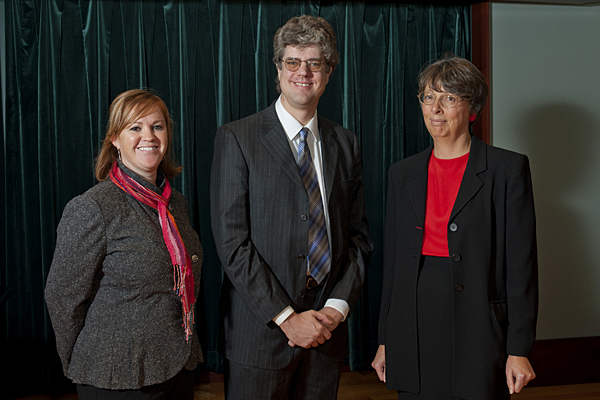
Nobel expertise
Faculty members explain this year's prize-winning research
8:19 a.m., Nov. 1, 2011--From the importance of women as peacemakers, to the accelerating expansion of the universe, to the role of cause and effect in macroeconomics, the research that won Nobel Prizes this year covered a broad variety of topics.
And yet, according to Doug Doren, it was "surprisingly easy to find University of Delaware faculty members who are intimately familiar" with the prize-winning research and willing to explain it to an audience at UD's annual Nobel Symposium. That's the case because of both the importance of the work that earns Nobel Prizes and also the breadth of the University's faculty, says Doren, associate dean in the College of Arts and Sciences and organizer of the event.
Research Stories
Chronic wounds
Prof. Heck's legacy
The two-part symposium began Oct. 21 with speakers discussing the Nobel Prizes in physiology or medicine, chemistry and literature, and it concluded Friday, Oct. 28, with discussions of the prizes awarded for peace, economics and physics.
Peace Prize
The selection of Ellen Johnson Sirleaf and Leymah Gbowee of Liberia and Tawakkul Karman of Yemen as winners of this year's Nobel Peace Prize was a "testament to peace-building in sisterhood [by] this trifecta of strong and resilient women," said Kara Ellerby, assistant professor of political science and international relations.
The women were honored "for their nonviolent struggle for the safety of women and for women's rights to full participation in peace-building work," according to the Nobel citation.
Ellerby, who has a joint appointment in Women's Studies, told the symposium audience that women often are instrumental and successful in peace-building efforts but are frequently overlooked when the history of such movements is told. In conflicts such as recent civil wars in Africa, for example, women generally have been portrayed as victims rather than as active participants in rescuing their families and others and working to end the violence, Ellerby said.
By building networks that promote both peace and women's rights, she said, such phenomena as the "Arab Spring" popular uprisings become social as well as political movements.
Physics
Since the 1920s, physicists have realized that the universe is expanding, John Gizis said, and the question of whether that expansion is occurring at a steady rate seemed obvious: Of course, the pace of expansion would be slowing due to the effects of gravity.
That assumption turned out to be wrong, according to Gizis, associate professor of physics and astronomy, who explained the Nobel Prize-winning research conducted by Saul Perlmutter, Brian P. Schmidt and Adam G. Riess. Working independently in two teams, he said, the physicists studied the brightness of supernovae and saw indications that not only was the universe's expansion not slowing but it was actually speeding up.
"This was not a 'Eureka!' moment," Gizis said, as both teams initially thought they must have been making a mistake in their observations. But, with each group reaching the same conclusion, they and other physicists realized that the results were correct.
"The universe will apparently expand forever," Gizis said. "We don't know why. … That's [the subject for] a future Nobel Prize."
Economics
Economists who once relied heavily on statistical models began to realize in the 1970s that those models weren't always working, said Stacie Beck, associate professor of economics, in discussing the work of Nobel laureates Thomas J. Sargent and Christopher A. Sims.
Sargent and Sims studied other, sometimes unexpected, effects on the economy in addition to economic policy. For example, Beck said, in trying to predict if a tax decrease will encourage spending, public perceptions and misperceptions play a role. If people believe that a tax cut is only short-term, they might not spend or invest those tax savings regardless of what economic policy would expect, she said.
Both Sargent and Sims rejected the previous linear models in favor of studying the two-way relationship between cause and effect. In announcing the economics prize, the Nobel organization noted that macroeconomic researchers cannot carry out random experiments but must look at historical data.
"The laureates’ foremost contribution has been to show that causal macroeconomic relationships can indeed be analyzed using historical data, even in cases with two-way relationships," the organization said.
Nobel Prizes have been awarded annually in the fields of physics, chemistry, literature, peace and physiology or medicine beginning in 1901. Since 1968, the Sveriges Riksbank Prize in Economic Sciences in Memory of Alfred Nobel also has been awarded each year.
Article by Ann Manser
Photo by Kathy F. Atkinson








